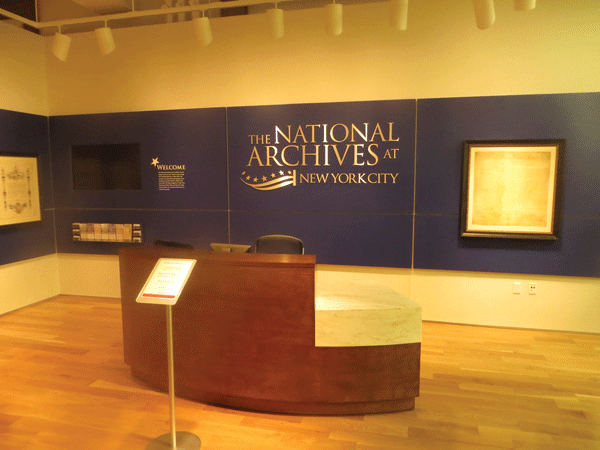
BY NICOLAS FERNANDES | After visiting the National Archives and Records Administration in Lower Manhattan, an Italian couple found out that the husband’s grandfather returned to Italy after his arrival in America, so he could get married and bring his wife back to the states.
Volunteer Heather Morrison helped the couple by finding the ship manifests and photos for the trips that Angelo, the man’s grandfather, took between Italy and America. They found that he came alone on the first trip and came back with a wife on the second.
They also discovered that he began citizenship process when he first came to America, but did not complete it until after coming back.
“The couple was excited to leave with a lot more information on the grandfather than they had previously,” Morrison said.
Morrison also helped a woman who had a family heirloom from her aunt’s husband. She knew that he was previously married and wanted to return it to the children from that marriage. They discovered that the daughter was deceased, but found the obituary, which mentioned survivors. She decided to write to one of the survivors and send him the heirloom.
Chris Gushman, director of archival operations in New York, said, “Many researchers begin their experience at the National Archives through family history research. The New York office is a particularly rich trove of genealogy information, with immigration records for the Port of New York including Castle Garden and Ellis Island. So many immigrants, from so many places, settled in the city and metro area. The office holds naturalization records with photos and personal details found nowhere else,”
The Archives, located at One Bowling Green, is a federal agency that keeps public records and provides genealogy research. It is the holder of federal records from New York, New Jersey, Puerto Rico, and the U.S. Virgin Islands dating back to 1685.
Anyone who can identify what specific records they want can order copies online. Volunteers are available for those who need help locating records or researching a specific person.
Performing research is free, but certain fees do apply. The organization charges $0.60 for microfilm copies, $0.80 for staff made copies, $15 for certifications, $10 for naturalization records, and $25 for certified naturalization records.
The Archives originated in Washington D.C. in 1935 and has since expanded to over 40 locations. The Washington D.C. branch is the holder of government documents such as the Constitution, the Bill of Rights, and the Declaration of Independence.
The New York branch has more than 140,000 cubic feet of records specifically immigrant, naturalization, court, and National Park service records.
The welcome center features two rooms that display famous records in glass cases. These include a photo of refugees registering for the Fort Ontario Emergency Refugee Camp, Russian dancer Mikhail Baryshnikov’s petition of naturalization, and Dean Martin’s bankruptcy petition.
The research center has computers and collections of photos, drawings, textual records, and sound and video recordings for genealogy research.
“I was extremely impressed at how organized and efficient the archives are, and how knowledgeable and helpful the staff were,” said Scottish painter Michael Miller. “The research room is also a great environment in which to work,”
Miller is participating in the Brooklyn Navy Yard’s Visiting Artist Program. He is developing a series of paintings of Allied ships between the first and second world wars and visited the Archives to research images of ships under construction and being camouflaged at the yard.
NARA hosts a monthly Finding Family event, which always features different guest speakers and discussion topics.
The Archives is open Monday to Friday from 10 a.m. to 5 p.m. and one Saturday each month from 10 a.m. to 4 p.m.































